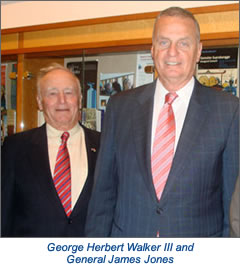
On October 11, Former National Security Adviser under President Obama, former NATO Commander and retired U.S. Marine Corps Commandant James L. Jones spoke on the subject, “National Security in the 21st Century.” It was this year’s George Herbert Walker Jr. Lecture in International Studies.
“It has been closely dependent on the ability of nations to understand the environment that surrounds them to be successful and even to survive,” he said, “and it’s critical to understand when that environment is changing,” which it has been doing rapidly in the past year.
“I don’t buy into the doomsday scenario about the decline of the United States,” he continued, “but I do believe we are at a critical intersection of our history with the world we helped create in the latter half of the 20th century. The world is smaller, information travels faster, the gap between the haves and the have-nots is increasing, and we have to worry about things we did not used to worry about,” like climate change, water scarcity, and the source and availability of energy.
Jones said that in the last half of the 20th century, “We faced symmetrical challenges in a bipolar world that had, compared to today, a sense of order that no longer exists.” He described the dissolution of the Soviet Union in the early 1990s without a shot being fired and some of the predictions of the time: “global peace; turning swords into plowshares; some voiced concern about the impact of an unrivaled United States. In short, the long-term prospect for global peace and tranquility seemed possible, certainly within reach.” He said many countries began following the U.S. model, “but today we face unprecedented challenges from these newly reformed nations, who have established very close links between their public and private sectors,” and made themselves competitive in the 21st century.
He called this development “a major change to the world as we know it, and it seems to me that we must deal with that challenge more effectively than we are doing today,” with the same laws and policies in place from the last century, “that overly restrict the abilities of our business sector and our corporations to compete in the global market.” He called export control reform a national security issue.
Jones said what has replaced the bipolar world is “a long-term conflict that is best described as a war of ideologies in which, throughout much of the underdeveloped world, we are portrayed as the principal reason for oppression, either by our physical presence on the planet, or by our support to forms of government that are considered oppressive by the people.”
He said these changes have had a profound impact, prompting some changes that have contributed to U.S. security. “By combining the National Security Council and the Homeland Security Council, we recognize there is no border where international and national threats are concerned. He said the National Security Council has been expanded to address commerce, trade, cyber-security and the war on terror. On the negative side, he said the lack of an energy policy is a critical gap in America’s national security portfolio.
He said a purely military response – what was most often applied in situations in the past – is no longer appropriate, and 21st century reaction must consider economic issues, security and governance. “These are remedies that will most likely be applied by international coalition.”
Jones said the 21st century world will be different. “We can’t ignore it; we cannot withdraw from it, and we cannot fail unless we’re willing to accept a lesser role for this nation. I am convinced that Americans still expect that at the end of the day the United States will lead the world in most arenas.”
